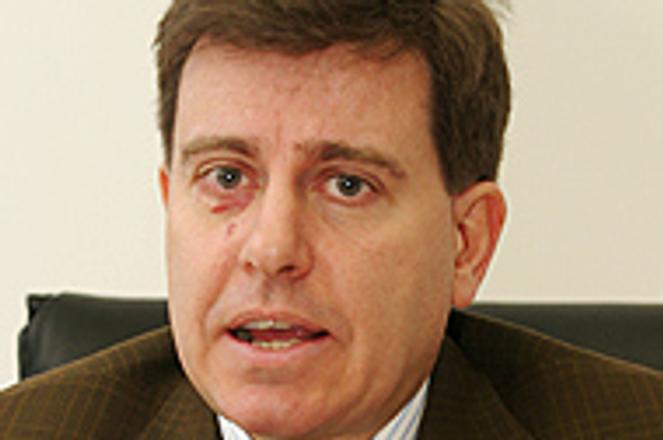PIERFRANCESCO Maria Natta: "Allocate more funds."photo: Anton Frič
PIERFRANCESCO Maria Natta, who is head of the local Office of the United Nations High Commissioner for Refugees (UNHCR) in Bratislava, believes that Slovakia has much to improve about its asylum policy. In an interview November 8, Natta shared his views with The Slovak Spectator (TSS).
TSS: How would you characterize Slovakia's asylum policy?
Pierfrancesco Maria Natta (PMN): Statistics can define it. In the last three years 26,000 applicants asked for asylum and only 33 were granted legal status. In 2004, only two were granted asylum - the rest disappeared and moved further west before receiving a decision.
This system discourages refugees and helps smugglers abuse them. The system fails to define between refugees, those who are fleeing persecution and entitled to protection, and those who are economic migrants, some of whom should return to their countries and some of whom should be given a chance to work here legally. This burden is shifted to neighbouring countries.
TSS: Why do you think Slovakia granted so few asylums this year, or in the previous years, for that matter?
PMN: The Migration office (MO) said that there were no refugees among the asylum applicants, but this is nonsense. In Austria, 56 percent of applicants have obtained asylum. In Poland, 710 have been granted refugee status even though there were fewer applicants than in the Slovak Republic.
Again, the statistics give a clear verdict. I remember reading in The Slovak Spectator last September that Bernard Priecel [the director of the Slovak MO] stated: "We are conservative because Slovakia is not in an economic position to afford to issue unlimited asylum to people for humanitarian reasons".
This reason is not only a bad one but also wrong. It goes against the obligations taken by the Slovak Republic when it acceded to the [EU]. According to the 51 Convention on the status of refugees that Slovakia agreed to, refugee status is granted not on the economic possibility of a country to support refugees, but on criteria that should be interpreted correctly.
In addition, this reasoning does a disservice to a country that has seen several of its citizens receiving help abroad either as refugees or as migrants in the past. Probably what Priecel wanted to say was that not enough resources had been granted to his office to cope with the increased caseload, and this forced him to be "conservative".
TSS: Just recently the media reported on a petition against a refugee camp for children made by citizens in Trenčín. Why do you think people don't want refugees in their backyard?
PMN:What happened in Trenčín is the opposite of what happened in Čelovce near Košice where a similar project is underway. In Čelovce, an NGO has been given the task to create a similar centre.
The local mayor and the church were contacted in advance of the project, and the local population has been informed. Everybody in Čelovce, as far as I know, has been open to help unaccompanied minors find solutions.
In Trenčín, I imagine the people were not approached so gingerly.
A similar project in Hungary last year was inaugurated by the heads of state, signalling how important the authorities felt it was to support this issue. In Rohovce and Opatovská Nová Ves, as well as in Liptovské Vlachy, after the opening of refugee centres, people have changed their first uneasiness and many now work for the centre.
TSS: What needs to be done to eliminate people's fears of refugees?
PMN:Information is the key to removing prejudices. And involving the population in the projects would help build bridges.
Journalists can really help in this, too. If more stories like those covering the refugee centres could be brought before readers, I am sure there would be more empathy for these people who are risking their lives to reach a safe country. In some cases these people have lost relatives, and have been detained and tortured.
TSS: The most common fears are that refugees bring disease and crime. Are these fears justified?
PMN: Absolutely not. The Slovak Republic is one of the few countries in the EU in which medical screenings are compulsory, and very few applicants are affected by serious diseases. The same for criminality - we have no record of particular crimes committed by applicants. The reality is that migrants and refugees are victims of criminal gangs who are keeping them in terrible conditions.
Some are killed by unscrupulous criminals before they reach safety in the EU.
TSS: In terms of EU standards, what does Slovakia need to do to improve its asylum policy?
PMN: The final report of a joint task force (between the UNHCR, the Migration Office, the European Commission's delegation, some embassies and NGOs), which was finalized in May, gives detailed recommendations.
To sum it up, Slovakia should allocate more funds and human resources to create a fair asylum system. Decentralization and delegation of tasks to NGOs and local municipalities could help the government deal with the situation. Change in public mentality is also required - and not only for Slovakia, but for all of the EU.
If we understand that refugees should be protected and that migrants are a resource, a fair system will be workable in Slovakia and help the entire EU.
This is what High Commissioner Ruud Lubbers said to the EU's Interior Minister when discussing a new plan for a common approach to asylum: "A policy built on exclusion is not only immoral but also impractical" because it forces new arrivals into illegality.
A fair, efficient and fast system will help the continent avoid racism and xenophobia.


